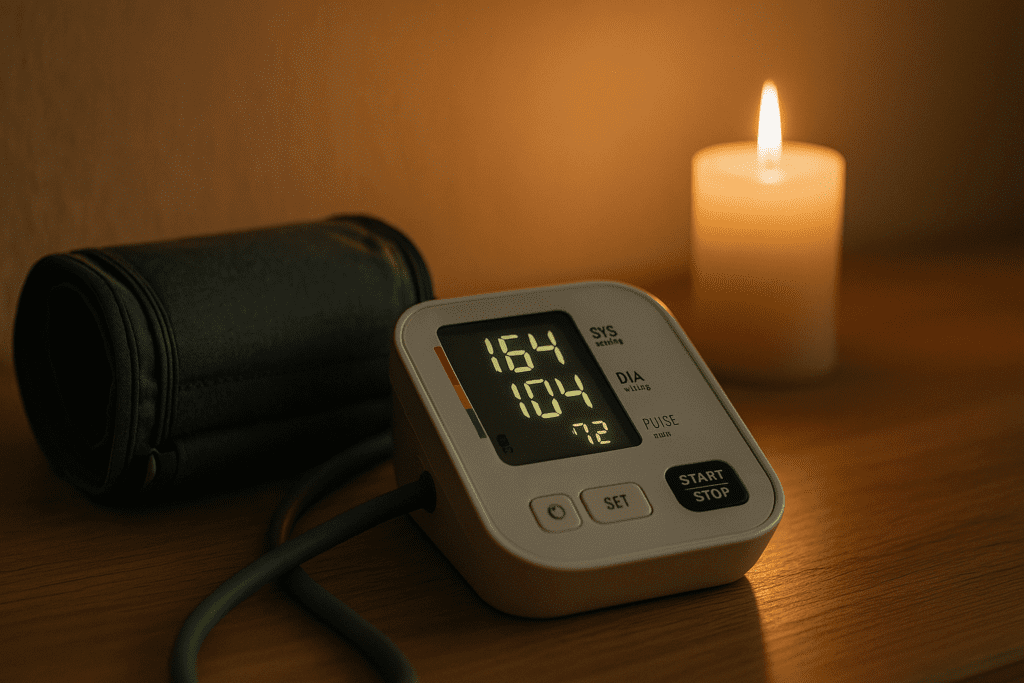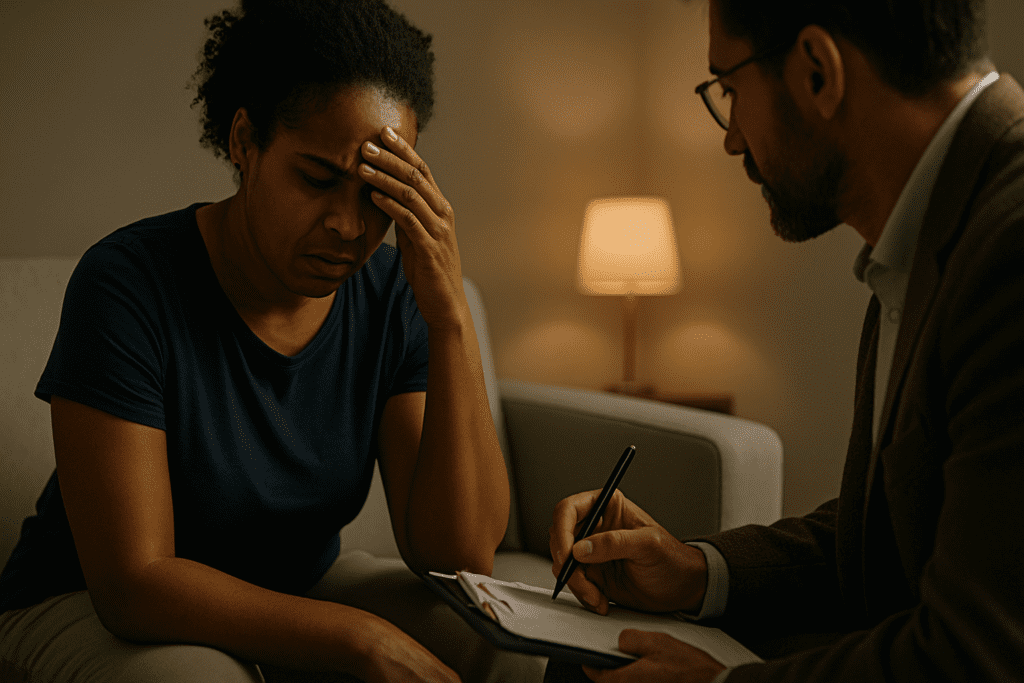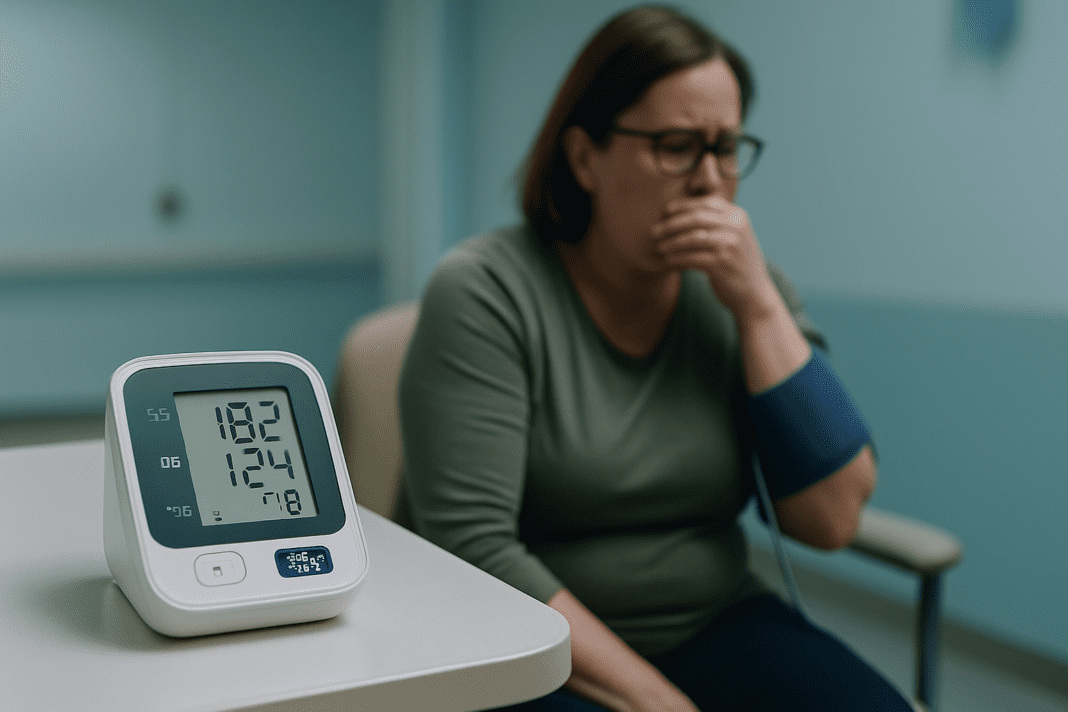Blood pressure is a vital sign that reflects the force of blood pushing against the walls of the arteries as the heart pumps. While fluctuations throughout the day are normal, a sudden and dramatic increase in blood pressure can be alarming and dangerous. These episodes are not always attributable to chronic hypertension alone but may signal an acute health issue requiring immediate medical intervention. Understanding what can cause a sudden increase in blood pressure is essential for both patients and healthcare providers, especially considering its role as a primary risk factor for cardiovascular disease.
Increases in blood pressure can arise without warning, leaving individuals wondering, “Why is my blood pressure high all of a sudden?” This article delves into the underlying causes, symptoms, and risks associated with sudden blood pressure spikes, while also exploring chronic hypertension (chronic HTN) and its progression. We also examine the physiological and environmental factors that influence blood pressure, how high blood pressure makes you feel, and how unmanaged episodes of elevated pressure can lead to life-threatening consequences.
You may also like: Best Salt Substitutes for High Blood Pressure: Doctor-Recommended Alternatives for Managing Hypertension Naturally
Understanding Blood Pressure and Its Role in Cardiovascular Health
To comprehend the seriousness of sudden blood pressure increases, it’s crucial first to understand the nature of blood pressure itself. Measured in millimeters of mercury (mm Hg), blood pressure is expressed as two numbers: systolic (the pressure during heartbeats) over diastolic (the pressure between beats). A reading of 120/80 mm Hg is considered normal. Elevated levels, especially consistent readings of 130/80 mm Hg or higher, signal hypertension.
Chronic hypertension is a condition in which blood pressure remains consistently elevated over time. It is a leading contributor to cardiovascular morbidity and mortality worldwide. The impact of hypertension on cardiovascular health is profound; it increases one’s risk of heart disease, high blood pressure-induced stroke, kidney failure, and other vascular complications. The presence of chronic HTN can also make individuals more susceptible to episodes of uncontrolled hypertension—dangerous surges in blood pressure that exceed the body’s ability to adapt.
Uncontrolled hypertension is particularly concerning because it often develops silently. Many individuals do not realize their condition until it reaches a critical stage. Understanding the early signs and knowing what causes blood pressure to spike can help prevent complications before they arise.
What Can Cause a Sudden Increase in Blood Pressure?
A variety of triggers can cause sudden high blood pressure. These episodes may be fleeting or persist long enough to provoke complications. Among the most common reasons for a sudden increase in blood pressure are intense stress, physical exertion, stimulant use, and pain. Stressful events or anxiety can trigger the release of hormones like cortisol and adrenaline, which temporarily increase heart rate and constrict blood vessels, resulting in a spike.
Pain and high blood pressure causes are intricately linked. Acute pain stimulates the sympathetic nervous system, which in turn elevates blood pressure as a survival mechanism. Furthermore, certain medications—especially nonsteroidal anti-inflammatory drugs (NSAIDs), corticosteroids, and decongestants—can induce hypertension in sensitive individuals. Dietary choices, such as excessive salt intake or binge drinking, may also provoke a sudden increase.
Medical emergencies, including stroke, heart attack, or a hypertensive crisis, often present with sudden high blood pressure. These situations demand immediate medical intervention. Secondary hypertension, caused by conditions like kidney disease or adrenal tumors, may first become apparent through an abrupt rise in pressure. For these reasons, unexplained or recurrent spikes should never be ignored.

Why Is My Blood Pressure High All of a Sudden?
For many, sudden elevations in blood pressure come as a surprise, especially in the absence of chronic hypertension. Asking, “Why is my blood pressure high all of a sudden?” is common among individuals who consider themselves otherwise healthy. Sometimes, the explanation lies in overlooked lifestyle habits or acute physiological responses.
Lack of sleep, dehydration, emotional turmoil, and even caffeine sensitivity can cause transient increases. In women, hormonal fluctuations related to menstruation, menopause, or pregnancy can lead to episodes of elevated blood pressure. For others, the reason may be less benign. Conditions such as preeclampsia in pregnant women or autonomic dysreflexia in individuals with spinal cord injuries may provoke sudden hypertensive episodes with life-threatening implications.
Other reasons for sudden increase in blood pressure include poor medication adherence, abrupt discontinuation of antihypertensive drugs, and thyroid dysfunction. These episodes are often preventable with proper management and awareness. Understanding the causes of sudden elevated blood pressure helps to demystify these events and guides both prevention and timely intervention.
High Blood Pressure Symptoms in Women: A Closer Look
While hypertension often affects men and women similarly, there are nuanced differences in presentation. High blood pressure symptoms in women may be more subtle or mistaken for other conditions. Women are more likely to experience symptoms such as fatigue, dizziness, palpitations, nausea, and anxiety. Chest pain or tightness, which is commonly associated with cardiac issues, may also be a sign.
High blood pressure and chest tightness, particularly in postmenopausal women, can indicate an elevated cardiovascular risk. This combination of symptoms should never be disregarded, as it could signify an impending cardiac event. Women may also report headaches, vision changes, or swelling in the hands and feet—symptoms often overlooked in routine assessments.
The question, “Can you feel high blood pressure?” often arises, and the answer is nuanced. While chronic hypertension is typically asymptomatic, sudden spikes can indeed produce noticeable sensations. Recognizing how you feel when you have high blood pressure is vital. Feelings of pressure in the head, pounding in the chest or ears, and sudden flushing are often reported during hypertensive episodes.
What Causes High Blood Pressure in Young Adults?
Hypertension is often associated with aging, but an increasing number of young adults are being diagnosed with elevated blood pressure. What causes high blood pressure in young adults, or more specifically, what causes high BP in young adults, is a multifactorial issue. Key contributors include obesity, sedentary lifestyles, poor diets, smoking, and chronic stress. The widespread consumption of processed foods and sugary beverages has exacerbated the issue.
Genetic predisposition also plays a role. Young individuals with a family history of hypertension may be more prone to developing the condition early. Another factor is the growing prevalence of mental health challenges among younger populations. Stress, anxiety, and depression have a demonstrable impact on blood pressure regulation. Moreover, certain medications, including oral contraceptives and ADHD treatments, may raise blood pressure levels.
Sleep apnea, once thought to affect primarily older adults, is now increasingly recognized in younger people and contributes to elevated blood pressure. The influence of sleep disorders on cardiovascular health underscores the importance of early screening and intervention. Left untreated, hypertension in young adults may progress to chronic HTN with significant long-term consequences.

The Ten Most Common Causes of High Blood Pressure
To better understand what are the main causes of hypertension, it helps to examine the most frequently encountered factors. What are the 10 causes of high blood pressure? While the list is not exhaustive, the following are among the most common contributors:
Poor diet, especially high sodium intake, Obesity, Physical inactivity, Excessive alcohol consumption, Smoking, Chronic stress, Kidney disease, Hormonal disorders, Sleep apnea, and Genetics. Each of these factors can contribute alone or in combination to persistent elevations in blood pressure. Moreover, they serve as reminders that lifestyle modification remains a cornerstone of hypertension prevention and treatment. Addressing these underlying causes reduces the likelihood of both chronic hypertension and acute episodes of elevated pressure.
Can You Die from High Blood Pressure?
One of the most sobering realities of hypertension is its potential to lead to fatal outcomes. Can you die from high blood pressure? Unfortunately, the answer is yes. Prolonged and uncontrolled hypertension damages the arteries, heart, brain, and kidneys. Over time, this damage culminates in events such as heart attack, stroke, and heart failure—conditions that can indeed be fatal.
Acute episodes of extremely high blood pressure, known as hypertensive crises, are medical emergencies. These can cause rapid organ damage, particularly to the brain and heart, and may result in death if not promptly treated. Sudden high blood pressure causes such as aneurysm rupture, acute heart failure, or ischemic stroke must be addressed urgently to avoid catastrophic outcomes.
Public awareness campaigns often emphasize the silent nature of high blood pressure. Yet this very silence can be deadly, as individuals may ignore symptoms or avoid routine screening. The impact of hypertension on public health cannot be overstated. It is responsible for millions of deaths globally each year, emphasizing the need for vigilance and proactive care.
How Does High Blood Pressure Make You Feel?
While hypertension is often dubbed the “silent killer,” it is important to note that some people do feel physical effects when their blood pressure is elevated. How does high blood pressure make you feel? Common sensations during hypertensive episodes include throbbing headaches, feelings of pressure behind the eyes, dizziness, and shortness of breath. Some individuals report a sense of anxiety or unease, while others experience blurred vision or a rapid heartbeat.
These symptoms may be particularly noticeable during periods of acute stress or exertion. For those with uncontrolled hypertension, the frequency and intensity of these sensations may increase over time. Recognizing how you feel when you have high blood pressure can serve as a valuable early warning system. Individuals who become attuned to these signs are more likely to seek timely medical care, reducing the risk of serious complications.
Risk Factors Associated with Hypertension and Its Cardiovascular Impact
The development of hypertension is rarely attributable to a single cause. Rather, it stems from a confluence of behavioral, genetic, and environmental influences. Among the most prominent risk factors associated with hypertension are age, obesity, high sodium intake, physical inactivity, and family history. Ethnicity and socioeconomic status also play roles, affecting access to care and health education.
The impact of hypertension extends far beyond the vascular system. It increases one’s risk of heart disease, high blood pressure-induced stroke, and cognitive decline. The long-term strain on blood vessels weakens their structure and function, predisposing individuals to aneurysms, kidney disease, and visual impairment. Understanding which of the following is a possible result of hypertension—ranging from heart failure to vascular dementia—underscores the importance of early intervention and sustained management.
While risk factors are not entirely preventable, their influence can be mitigated. Adopting a heart-healthy diet, maintaining a healthy weight, engaging in regular physical activity, and managing stress are foundational strategies for reducing blood pressure and its associated risks. Consistent monitoring and adherence to prescribed treatments further enhance outcomes.
When to Seek Medical Attention for Sudden Blood Pressure Spikes
It can be difficult to determine when a sudden increase in blood pressure warrants medical evaluation. Generally, a single isolated spike is not a cause for panic. However, if symptoms accompany the elevation—such as chest pain, difficulty breathing, confusion, or vision disturbances—it is crucial to seek immediate care. These may signal a hypertensive emergency.
Causes of sudden elevated blood pressure vary in severity, but any episode that deviates from an individual’s normal range should be taken seriously. The reason for sudden high BP may be as simple as missed medication or as complex as a neurological event. In all cases, tracking patterns and identifying triggers with the help of a healthcare provider can guide effective management.
Timely intervention not only prevents acute complications but also aids in identifying underlying health issues. Those living with chronic HTN should be especially vigilant, as they are at greater risk for uncontrolled hypertension. Tools such as home monitors and mobile health apps empower patients to track their readings and share data with providers.

Frequently Asked Questions: Understanding Sudden Blood Pressure Spikes and Hypertension
1. Can emotional trauma or mental health disorders trigger sudden spikes in blood pressure?
Yes, emotional trauma and mental health disorders such as PTSD, anxiety, and depression can contribute to sudden high blood pressure. Psychological stress stimulates the autonomic nervous system, leading to vasoconstriction and increased heart rate, which are direct reasons for sudden high BP. In fact, episodes of panic attacks may mimic or even cause what can be described as sudden high blood pressure. While not everyone is equally sensitive, people with pre-existing chronic hypertension are more likely to experience these fluctuations. This underscores how intertwined emotional well-being is with the physiological factors that influence blood pressure.
2. Are there any overlooked lifestyle habits that may explain why my blood pressure is high all of a sudden?
Absolutely. Beyond the usual culprits like diet and exercise, lesser-known factors such as poor sleep posture, chronic dehydration, and even excessive screen time can disrupt blood pressure regulation. These often contribute to what causes blood pressure to spike unexpectedly. For individuals with chronic HTN, even minor deviations in routine—like skipping a morning coffee or experiencing interrupted sleep—can lead to noticeable fluctuations. Understanding these nuanced contributors helps clarify why your blood pressure might be high all of a sudden despite seemingly good health.
3. How does chronic pain contribute to high blood pressure and what makes this link clinically significant?
Chronic pain activates a continuous stress response in the body, particularly through elevated cortisol levels and sympathetic nervous system overdrive. This dynamic is a major factor in both what can cause a sudden increase in blood pressure and sustained elevations over time. Pain and high blood pressure causes are particularly relevant in patients with conditions like fibromyalgia or arthritis, where ongoing discomfort keeps blood pressure elevated. Furthermore, chronic pain can interfere with sleep and emotional health, which are additional factors affecting blood pressure. In clinical practice, managing pain effectively often leads to better hypertension outcomes.
4. What causes high blood pressure in young adults who have no family history of the condition?
It’s a common misconception that genetics are the only driver of hypertension. In reality, what causes high blood pressure in young adults often includes environmental exposures, high-stress academic or work environments, overuse of stimulants like caffeine or energy drinks, and undiagnosed sleep apnea. The fast-paced, tech-driven lifestyle of many young adults also means increased sedentary behavior and higher exposure to processed foods. Thus, what causes high BP in young adults often stems from modifiable lifestyle habits rather than hereditary risk alone.
5. Are there gender-specific warning signs of high blood pressure that women should be aware of?
Yes, high blood pressure symptoms in women can differ in presentation and are sometimes misattributed to anxiety or hormonal shifts. Women may experience subtle signs like jaw or upper back pain, irregular heartbeat, and unexplained fatigue rather than classic chest pain. High blood pressure and chest tightness may be more common during perimenopause or postmenopause, adding complexity to diagnosis. This distinction is important because it shapes how we recognize how high blood pressure makes you feel differently across genders. Early detection in women may require more attentive symptom analysis during routine care.
6. What are the lesser-known causes of sudden elevated blood pressure that doctors often consider during diagnosis?
Medical professionals evaluate a range of sudden high blood pressure causes that go beyond stress or dietary factors. These include adrenal tumors (like pheochromocytoma), renal artery stenosis, thyroid dysfunction, and medication side effects. What can cause sudden high blood pressure sometimes involves interactions between prescribed drugs and over-the-counter supplements, or even abrupt cessation of antihypertensive medication. For patients with chronic hypertension, these conditions can exacerbate baseline readings and contribute to uncontrolled hypertension. Such cases highlight the need for a thorough medical history and personalized diagnostics.
7. How do social determinants and chronic stress contribute to the impact of hypertension on long-term health outcomes?
Social determinants—like income inequality, lack of access to healthcare, and food insecurity—have a direct influence on hypertension management. These conditions create chronic stress, which significantly increases one’s risk of heart disease; high blood pressure in these settings often remains undiagnosed or poorly controlled. These external stressors are among the most persistent and overlooked factors that influence blood pressure. The impact of hypertension is particularly profound in marginalized communities, where long-term stress amplifies vascular damage. Addressing these systemic issues is critical in reducing the burden of chronic HTN nationwide.
8. Can someone feel high blood pressure without using a monitor? What sensations are most commonly reported?
While a blood pressure cuff remains the most accurate diagnostic tool, many people wonder, “Can you feel high blood pressure?” In truth, some individuals do report sensations such as facial flushing, headaches, a pounding pulse in the neck or ears, or lightheadedness. These symptoms may reflect how you feel when you have high blood pressure, especially during a spike. However, these signs are subjective and can be misinterpreted, which is why self-monitoring remains essential, especially for those with uncontrolled hypertension. Still, becoming attuned to bodily signals can help prompt timely medical checks.
9. What role does sleep play among the top ten causes of high blood pressure?
Poor sleep is increasingly recognized among what are the 10 causes of high blood pressure. Conditions like sleep apnea, restless leg syndrome, and even chronic insomnia contribute to nocturnal blood pressure surges. Sleep deprivation also disrupts the hormonal balance that regulates the circadian rhythm of blood pressure. In younger populations, irregular sleep cycles related to shift work or screen exposure are significant contributors to what causes high BP in young adults. Recognizing sleep quality as a factor affecting blood pressure is key to building effective, comprehensive treatment strategies.
10. What future innovations are shaping how we understand and manage chronic hypertension?
The landscape of hypertension management is rapidly evolving. Wearable tech now allows continuous blood pressure monitoring, offering real-time insights into what causes blood pressure to spike throughout the day. AI algorithms can predict hypertensive events by analyzing trends in biometric data, which may help in forecasting the reasons for sudden increase in blood pressure. Pharmaceutical innovations are targeting specific molecular pathways in patients with resistant or chronic hypertension. As our understanding of the factors that influence blood pressure deepens, personalized medicine will offer more precise and effective interventions. These advancements are poised to redefine how we approach the impact of hypertension in clinical and everyday settings.
Conclusion: Recognizing the Warning Signs and Managing Sudden Blood Pressure Spikes
The phenomenon of sudden increases in blood pressure serves as a potent reminder of the complex, dynamic nature of cardiovascular health. Whether due to emotional stress, pain, medication, or an underlying medical condition, recognizing the warning signs of these episodes is critical. Understanding what can cause a sudden increase in blood pressure enables individuals to respond appropriately and seek timely medical attention when necessary.
The progression from occasional spikes to chronic hypertension illustrates the need for proactive care. Identifying risk factors associated with hypertension and mitigating them through lifestyle changes, medication adherence, and routine monitoring are essential steps in preserving long-term health. Moreover, educating oneself about what causes high blood pressure in young adults and the often-overlooked high blood pressure symptoms in women fosters a more inclusive and effective public health approach.
Ultimately, being able to answer questions like “What are the main causes of hypertension?” or “Why does my blood pressure spike?” empowers individuals to take control of their health. In a world where the impact of hypertension continues to grow, informed awareness and timely action remain our most powerful tools against this silent but deadly condition.
elevated blood pressure risks, hypertensive crisis warning signs, blood pressure variability, cardiovascular disease prevention, lifestyle changes for heart health, sympathetic nervous system response, vascular health management, renal function and blood pressure, endocrine disorders and hypertension, female cardiovascular symptoms, stress-induced hypertension, sleep quality and heart health, early detection of heart conditions, real-time blood pressure monitoring, heart rate variability and stress, wearable health technology, personalized hypertension treatment, secondary hypertension causes, hidden symptoms of heart disease, impact of chronic stress on health
Further Reading:
What are some causes of sudden high blood pressure?
6 Facts About High Blood Pressure
Blood Pressure Spikes: What Can Cause Temporary High Blood Pressure
Disclaimer
The information contained in this article is provided for general informational purposes only and is not intended to serve as medical, legal, or professional advice. While MedNewsPedia strives to present accurate, up-to-date, and reliable content, no warranty or guarantee, expressed or implied, is made regarding the completeness, accuracy, or adequacy of the information provided. Readers are strongly advised to seek the guidance of a qualified healthcare provider or other relevant professionals before acting on any information contained in this article. MedNewsPedia, its authors, editors, and contributors expressly disclaim any liability for any damages, losses, or consequences arising directly or indirectly from the use, interpretation, or reliance on any information presented herein. The views and opinions expressed in this article are those of the author(s) and do not necessarily reflect the official policies or positions of MedNewsPedia.


